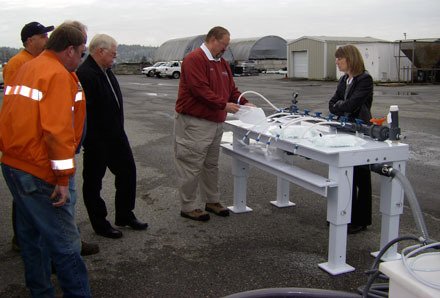MARYSVILLE — City of Marysville Public Works officials conducted an emergency drill on April 14 using Seattle Public Utilities’ designed “Emergency Drinking Water Provisioning System,” a mobile emergency water supply that can be set up in numerous locations throughout north Snohomish County and surrounding areas in the event of a major water supply issue.
In the event of damage or a water distribution line break caused by an earthquake that affects the supply of drinking water, the water table could be staffed by trained individuals to fill one-gallon plastic water bags that residents could pick up at designated areas depending on where earthquake damage occurred. The water table can fill the water bags via six supply hoses, providing residents from an uncontaminated potable water source such as a fire hydrant or water reservoir.
“Hopefully we will never need the system, but in the event of a localized emergency and due to the importance of being prepared, it’s good to know that it can be rolled out to provide a temporary drinking water source for our customers,” said city of Marysville Operations Manager Terry Hawley.
In its home city of Seattle, the device can deliver up to 612,000 gallons of water a day to six strategic distribution sites around the city.
City of Marysville officials recommend that each resident keep an ample supply of water stored at home in the event of an emergency. The recommended amount depends on the total amount of juices, soups, other drinks and high-moisture foods that are available, according to Hawley. Children, nursing women and ill people will need more. In general, store at least one gallon of water per person, per day of expected need. If you have pets, allow one quart per day for each animal. Storing at least a three-day supply is recommended, but storing two weeks’ worth is better if you have room for it, according to Hawley.
Emergency drill participants included Hawley, city Risk Management Officer Nancy Abell, Marysville Police Administrative Division Manager Bob Dolhanyk, Public Works Superintendent Larry Larson and Public Works Maintenance workers Duane Morgison and Eric Erga.



